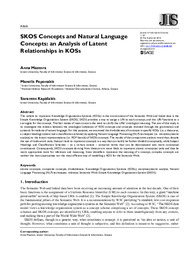| dc.contributor.author | Mastora, Anna | en |
| dc.contributor.author | Peponakis, Manolis | en |
| dc.contributor.author | Kapidakis, Sarantos | en |
| dc.date.accessioned | 2020-05-14T07:04:24Z | |
| dc.date.available | 2020-05-14T07:04:24Z | |
| dc.date.issued | 2016 | |
| dc.identifier.uri | http://hdl.handle.net/10797/26643 | en |
| dc.description | Περιέχει το πλήρες κείμενο. | en |
| dc.description.abstract | The vehicle to represent Knowledge Organization Systems (KOSs) in the environment of the Semantic Web and linked data is theSimple Knowledge Organization System (SKOS). SKOS provides a way to assign a URI to each concept, and this URI functions as a surrogate for the concept. This fact makes of main concern the need to clarify the URIs’ ontological meaning. The aim of this study is
to investigate the relation between the ontological substance of KOS concepts and concepts revealed through the grammatical and syntactic formalisms of natural language. For this purpose, we examined the dividableness of concepts in specific KOSs (i.e. a thesaurus, a subject headings system and a classification scheme) by applying Natural Language Processing (NLP) techniques (i.e. morphosyntactic
analysis) to the lexical representations (i.e. RDF literals) of SKOS concepts. The results of the comparative analysis reveal that, despite the use of multi-word units, thesauri tend to represent concepts in a way that can hardly be further divided conceptually, while Subject Headings and Classification Schemes – to a certain extent – comprise terms that can be decomposed into more conceptual constituents. Consequently, SKOS concepts deriving from thesauri are more likely to represent atomic conceptual units and thus bemore appropriate tools for inference and reasoning. Since identifiers represent the meaning of a concept, complex concepts areneither the most appropriate nor the most efficient way of modelling a KOS for the Semantic Web | en |
| dc.language.iso | eng | en |
| dc.source | ELIS | en |
| dc.source | Journal of Information Science 1-18 | en |
| dc.title | SKOS Concepts and Natural Language Concepts: an Analysis of Latent Relationships in KOSs | en |
| dc.type | Article | en |
| dc.subject.uncontrolledterm | Atomic concepts | en |
| dc.subject.uncontrolledterm | Composite concepts | en |
| dc.subject.uncontrolledterm | Dividableness | en |
| dc.subject.uncontrolledterm | Knowledge Organisation Systems (KOSs) | en |
| dc.subject.uncontrolledterm | Morphosyntactic analysis | en |
| dc.subject.uncontrolledterm | Natural Language Processing (NLP) techniques | en |
| dc.subject.uncontrolledterm | Relations | en |
| dc.subject.uncontrolledterm | Semantic Web | en |
| dc.subject.uncontrolledterm | Simple Knowledge Organisation System (SKOS) | en |
| dc.subject.JITA | Διαχείριση υπηρεσιών, λειτουργιών και τεχνικών πληροφόρησης | el_GR |
| dc.subject.JITA | Information treatment for information services, Information functions and techniques | en |
| dc.identifier.JITA | IZ | en |
